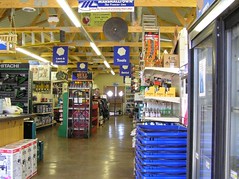
Small town retailers frequently pay higher wholesale cost for the same merchandise as other stores. Photo by Becky McCray.
One of our readers from Reimagine Goldendale asked this on Facebook:
People are constantly being encouraged to shop local, but small town retailers have a tough time keeping their prices down when their wholesale costs can be so high. Do you have any advice on how to order wholesale so retail prices can be more competitive? Are wholesalers ever “small business friendly”? Seems to me we need to get the wholesalers to rethink how they do business, not just the small town residents.
We’ve talked before about living with the higher prices wholesalers sometimes charge small town retailers, but never about how to get the wholesalers to improve. What would you suggest?
New to SmallBizSurvival.com? Take the Guided Tour. Like what you see? Subscribe.
- About the Author
- Latest by this Author
Becky started Small Biz Survival in 2006 to share rural business and community building stories and ideas with other small town business people. She and her husband have a small cattle ranch and are lifelong entrepreneurs. Becky is an international speaker on small business and rural topics.











And then you’ve got big box retail selling the exact same things your wholesaler does, but for even less than wholesale…
I run into that in my liquor store. We price our mixers by just rounding up to the nearest quarter. WalMart down the street sells mixers at nearly the same price, very close to our cost.
Our strategy is to offer different mixers, choices that WalMart ignores, and to sell them on convenience. “Yes, we have those right here.” We are hampered by not being allowed to sell some of the most popular mixing items, such as Red Bull, Coke, or even ice.
You can’t sell Coke or ice? Wow liquor laws are bizarre.
The laws are different in each state. We just deal with it.
Back to the question of working with wholesalers, Oklahoma requires all liquor wholesalers to sell at the same price to all stores, so I can’t offer much advice. That’s why I’m looking for your advice in working with wholesalers. What is possible? Who has a success story?
One things we’ve talked about a few times is developing a purchasing program/club through our Chamber. It would focus on larger commodity type items – copy paper, TP, etc. We’d buy locally through a supplier in bulk based on a yearly order from our businesses, ideally allowing us to get a better price and then simply store the product until the time it’s needed by each individual business. Would love to know if anyone out there is doing something like this?
That is a great idea! I wonder if you could also combine purchasing power with local anchor institutions like schools, government, and hospitals?
Yes, it is difficult to survive in that market where you have to compete with very low margin, especially for retailers who buy products on high prices from local wholesalers. But this is not necessary to buy from local wholesalers as you can buy products from other than local or near wholesalers. Because some big wholesalers offers free shipping on specific quantity or on specific amount and you can find them easily on internet. This will not only save your cost but also your time. You can use different wholesale directories to find the wholesale suppliers like ebay, Wholesale Pages, wholesaler365 etc.
I’m not sure that I like this direction: driving the market more towards a commodity interaction.
Becky,
My guess is that most wholesalers are looking for volume, and competing against Walmart on those terms is a losing proposition. Goliath will destroy David on this one, to use a metaphor. I am sorry if this seems blunt.
Follow up question – I did not get why you can’t sell Red Bull, Coke or even Ice?
As far as I can tell, the only way to solve this problem is to actually *change* the problem itself. Instead of asking: how can I compete against their obviously larger core competency (bulk purchases and low prices), ask what are their weak spots? You did it brilliantly when you started to sell products that Walmart ignores. What other opportunities is WalMart ignoring?
Sorry if it seems that I went a little off topic :-)
Cheers,
Marco
I think the approach of targeting the opportunities that WalMart ignores is directly on topic! Can you offer local products? Customized items? Different brands? Can you find inspiration from other retailers and adapt those ideas?
Off topic, my liquor store can sell liquor only. All items we sell, including mixers, must have alcohol in them. That means we have special mixers with 1% alcohol created just for this market. Thus, we pay a higher price. This is the Oklahoma liquor law.
I’m also thinking about the many retailer cooperatives, where retailers in one vertical market band together for better buying power. NAPA is actually National Automotive Parts Association. True Value Hardware is a retailer-owned hardware cooperative, with 4,500 member stores. Associated Wholesale Grocers is another example. Tons more examples out there.
Becky –
One question – how come the Walmart “down the street” can sell mixers and everything else, but your store can only sell liquor? Is “down the street” out of OK an into Kansas? I think you are close to the border, right?
The Walmart down the street is licensed to sell 3.2% (or low-point) beer. Low-point beer licensees can sell anything else non-alcoholic that they choose. These licensees include mostly grocery and convenience stores.
Our liquor store has a liquor license and can sell only hard liquor, wine, and beer above 3.2% (strong beer). We cannot sell any other products whatsoever.